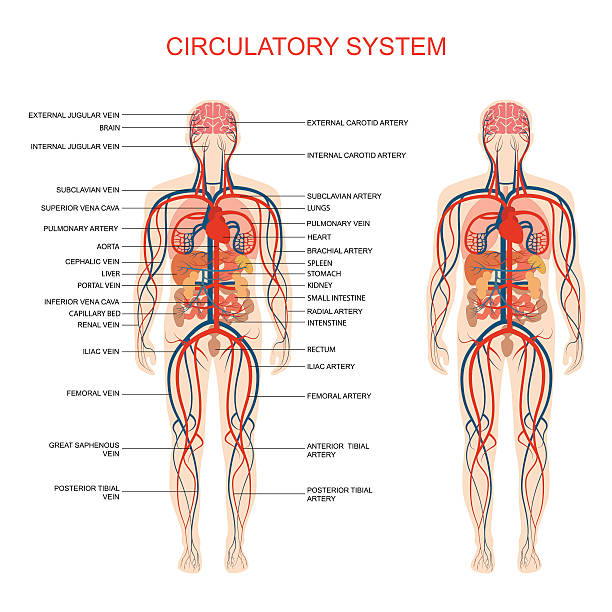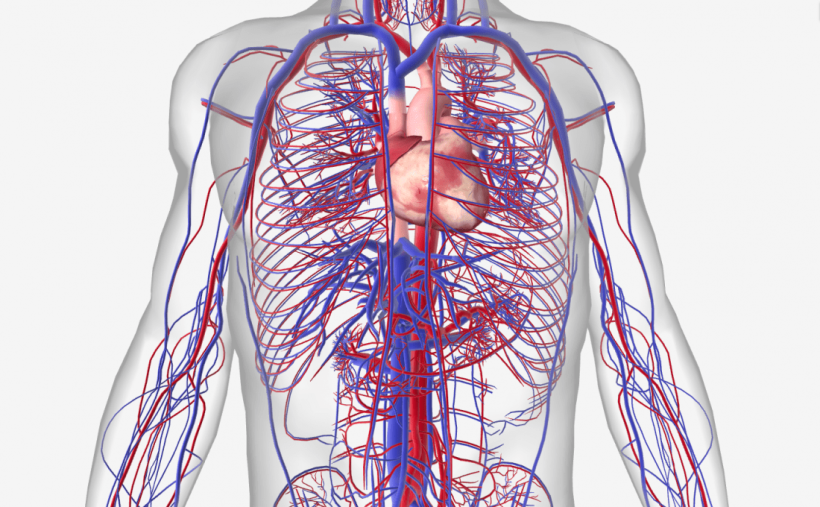| Circulatory System in the Humans |
Circulatory System in Humans
The circulatory system, also known as the cardiovascular system, is a vital organ system responsible for transporting blood, nutrients, gases, hormones, and waste products throughout the human body. It plays a crucial role in maintaining homeostasis and ensuring that all cells receive the materials they need for survival and proper function.
Components of the Circulatory System
The human circulatory system consists of three major components:
-
Heart
The heart is a muscular organ located slightly to the left of the center of the chest. It functions as a pump, ensuring continuous blood circulation. It has four chambers – two atria (upper chambers) and two ventricles (lower chambers). The right side of the heart receives deoxygenated blood from the body and pumps it to the lungs for oxygenation, while the left side pumps oxygenated blood to the rest of the body. -
Blood Vessels
These are the channels through which blood flows. There are three main types of blood vessels:-
Arteries: Carry oxygenated blood away from the heart to various body tissues (except pulmonary arteries which carry deoxygenated blood to the lungs).
-
Veins: Return deoxygenated blood back to the heart (except pulmonary veins which carry oxygenated blood from the lungs).
-
Capillaries: Tiny vessels where exchange of gases, nutrients, and waste occurs between blood and tissues.
-
-
Blood
Blood is the fluid that circulates through the blood vessels. It consists of:-
Red Blood Cells (RBCs): Carry oxygen from the lungs to body tissues using hemoglobin.
-
White Blood Cells (WBCs): Part of the immune system, help fight infection.
-
Platelets: Help in blood clotting.
-
Plasma: The liquid portion carrying nutrients, hormones, and waste products.
-

Types of Circulation
-
Pulmonary Circulation
This circulation pathway carries deoxygenated blood from the right ventricle of the heart to the lungs via the pulmonary arteries. In the lungs, carbon dioxide is released and oxygen is absorbed. The oxygen-rich blood returns to the left atrium of the heart via the pulmonary veins. -
Systemic Circulation
This pathway carries oxygenated blood from the left ventricle of the heart to the entire body through the aorta and its branches. After delivering oxygen and nutrients, the deoxygenated blood returns to the right atrium of the heart via veins. -
Coronary Circulation
This is the circulation of blood in the blood vessels that supply the heart muscle (myocardium). Coronary arteries provide oxygen-rich blood to the heart tissues, and coronary veins remove deoxygenated blood.
Functions of the Circulatory System
-
Transport of oxygen, carbon dioxide, nutrients, hormones, and waste.
-
Regulation of body temperature, pH, and water balance.
-
Protection against disease through white blood cells and clotting via platelets.
-
Maintains homeostasis by ensuring balanced internal conditions.
Disorders of the Circulatory System
Several diseases can affect the circulatory system:
-
Hypertension (High Blood Pressure)
-
Atherosclerosis (narrowing of arteries)
-
Coronary Artery Disease
-
Stroke
-
Heart Attack
-
Anemia
These conditions can lead to serious health consequences if not managed properly.
Conclusion
The circulatory system is central to human survival. It ensures that every cell gets the necessary substances and that waste products are efficiently removed. A healthy circulatory system is essential for a healthy life. Regular exercise, a balanced diet, and routine health checks are key to maintaining its optimal function.
For more updates, visit www.iasmania.com. Please share your thoughts and comments.
If you’re passionate about building a successful blogging website, check out this helpful guide at Coding Tag – How to Start a Successful Blog. It offers practical steps and expert tips to kickstart your blogging journey!
